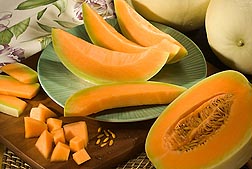USA
September 11, 2015

A U.S. Department of Agriculture (USDA) Agricultural Research Service (ARS) scientist in Pennsylvania has developed a sanitizing wash that could reduce the number of foodborne illnesses caused each year by E. coli, Salmonella and Listeria from fresh-cut produce.
Dike Ukuku, a food technologist at the ARS Food Safety and Intervention Technologies Research Unit in Wyndmoor, Pa., has developed a solution that works better than water, chlorinated water, or hydrogen peroxide at ridding surface bacteria from produce. The solution rids cantaloupes, honeydew melons, and other produce of bacteria that migrate on to cut pieces.
Each year about 1 in 6 Americans (or 48 million people) get sick; 128,000 are hospitalized; and 3,000 die of foodborne diseases, according to the U.S. Centers for Disease Control and Prevention. The wash, which Ukuku calls “Lovit,” could be formulated into a spray and used by food processors, supermarkets, restaurants, and anyone concerned about food safety. Ukuku has published a study highlighting its effectiveness, has filed a patent application, and has a commercial partner interested in marketing it.
In the study, Ukuku inoculated the rinds of cantaloupes with E. coli, Salmonella and Listeria. He washed them for 5 minutes in either Lovit (his treatment), hydrogen peroxide or chlorinated water. He allowed them to dry before cutting them into pieces. He then stored some pieces from each of the treatments in plastic tubs at room temperature (68 degrees Fahrenheit) for 24 hours, and others at chilled temperatures of either 41 or 50 degrees Fahrenheit for 15 days.
The results showed Lovit to be the most effective treatment of the three wash treatments, and it reduced pathogen levels to below detection levels required by food safety standards. The study was published in the Journal of Food Protection in July 2015.
Read more about this research in the September 2015 issue of AgResearch magazine. ARS is the USDA’s principal intramural research agency.